3D rendering software can help architects and design professionals to bring their three-dimensional models to life with realistic-looking images or videos.
It has become a mainstream representation method, unlike previous norms where 3D rendering was used only in high-value projects requiring exclusive rendering features.
And why not?
Customers, buyers, and decision-makers are evolving with technology. They want to see how your design looks realistically for different purposes like home or office buildings, gaming, product design, etc.
This generates the need for you to keep up with this demand and employ the best 3D rendering software that can help you represent your models realistically with greater accuracy, flexibility, detail, context, lighting, and other elements.
So, let’s discuss 3D rendering software and how it can help you.
What is 3D Rendering?

3D rendering refers to the process of creating three-dimensional or two-dimensional images of a model or design to illustrate how it will look realistically. It is done after a design is modeled in CAD software or 3D modeling software to present the design, such as a building, building interiors, façade, and so on before the construction begins.
3D rendering can depict a design photo-realistically using a special 3D rendering software. It will capture the 3D elements used in a design correctly and present them for demonstration.
To make the rendering more realistic, you can add texture, specific lighting, colors, weather, motion blur effects, and more. You can also make the rendered images scalable, navigable, and interactive to make the most out of your designs.
Types of 3D Rendering
3D rendering is of three types – solid, surface, and wireframe. All these methods perform 3D rendering differently with different editing methods. Hence, instead of clubbing them, you must go for only one of them based on your requirements.
- Solid 3D rendering: It uses the basic geometric shapes in 3D, such as boxes, cylinders, cones, wedges, spheres, concentric circles, etc. You can add each shape to produce more complex architecture and shapes. In addition, you can rotate a 2D object or drag it and create solids by revolving or sweeping it. This is the most convenient and fastest 3D rendering method.
- Surface 3D rendering: It defines the 3D design’s edges and surfaces and allows you to render the designs into a 360-degree and virtual reality, panorama, etc. This is an elegant method and uses a polygonal mesh consisting of planar faces.
- Wireframe 3D rendering: It is used to create a 3D design’s skeletal description and doesn’t involve any surfaces. Instead, it contains lines and points joined by curves, covering the object’s shape. It takes the longest amount of time for completion compared to the above two methods.
How is 3D Rendering done?
It all starts with 3D modeling or designing, representing a surface or object into a three-dimensional space. The design consists of points and lines forming a surface, triangle, square, curved surface, and other geometries.
Once your modeling is over, you can enhance it with lighting, coloring, and texture mapping. Next, you can render these models using 3D rendering software. It converts the model into an image, video file, or walkthrough to present them effectively for better understanding and to make it look more realistic.
The rendering process might take seconds, hours, and even days based on how much computation the image requires and the quality and speed of the software. Hence, choosing an efficient 3D rendering software is crucial.
Furthermore, designers go through several iterations in the model if they find something is off or improve some elements. Ultimately, they render the final piece to proceed with the construction process.
Where is 3D Rendering used?
Whether you are an architect, engineer, interior designer, or 3D artist, you need quality 3D rendering for your models. It’s no longer a luxury but a necessity for client pitches and presentations.
- It is used across different industries, including real estate, manufacturing and production, and entertainment like gaming and movies.
- The architecture industry is one of the biggest users with lots of 3D rendering software like Lumion.
- The Healthcare industry also uses 3D rendering software to create fully-realized 3D images of tools, implants, scanned body parts, prosthetics, etc., accessible easily for healthcare workers with increased model accuracy.
The software is also used in other industries like automotive design, manufacturing, product design, advertising, publishing, construction, fashion, geology, interior design, safety training, virtual reality, and more.
Difference between 3D modeling, rendering, and animation
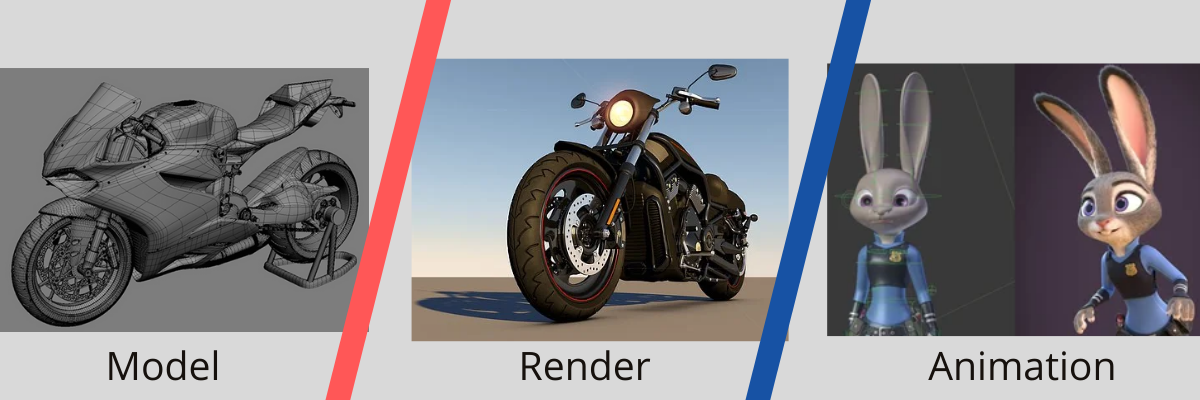
3D modeling, rendering, and animations are popular terms in architecture and design. Sometimes, they seem to be overlapping in terms of their purpose, especially when you are new to this industry.
People may use them interchangeably, but they are different in technical perspectives. In reality, 3D modeling, rendering, and animation fall under a series of procedures to create a 3D representation of a design or scene.
- 3D modeling involves creating an object or model using different geometric shapes in a 3D space with 3D modeling software.
- 3D rendering involves displaying the 3D model or design in the form of images, videos, or games.
- Animation is manipulating a design or model to make it movable in some way by changing its scale, location, rotation, or shape.
So, if you are looking for 3D rendering software, there are options to choose a standalone rendering engine or go for the one bundled with 3D animation software. If you choose the latter, you may have to compromise with some features because you get other animation capabilities together in the software.
But instead of going for a generalist tool, you can choose a specialist 3D rendering software that includes all the features to offer a superb rendering experience to you.
So, here’s a list of the best 3D rendering software you can try.
Autodesk 3D Rendering
Autodesk’s 3D rendering software offers shading, shadows, texture-mapping, motion blurs, reflections, and other visual effect options so that you can design visualization, simulators, movies, video games, etc.
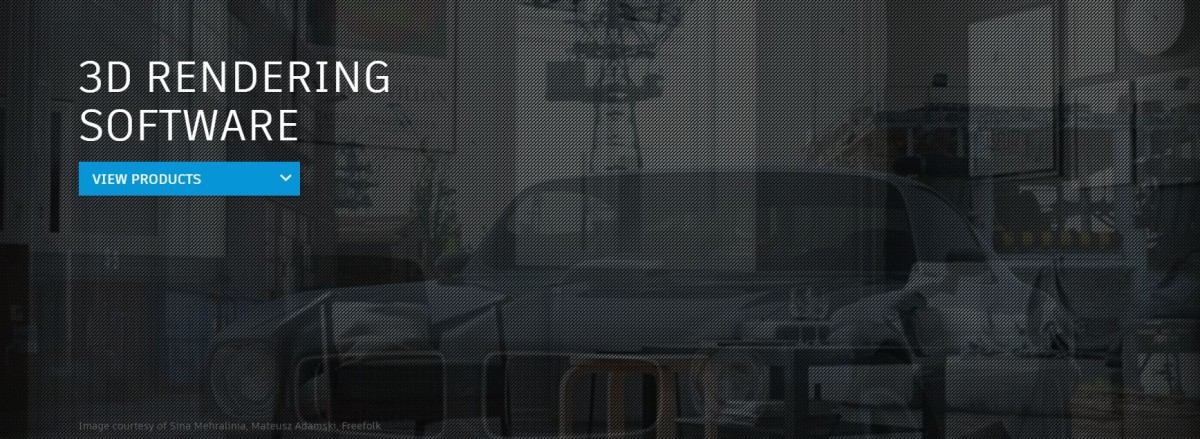
It provides software rendering, hardware rendering, cloud rendering, and vector rendering. Autodesk features many rendering software for you, such as Arnold, 3DS MAX, Maya, Revit, Vred, Autodesk rendering, Alias, and more.
Take a free trial for every rendering software you choose to get a clear idea of how it works and better understand while selecting the right software.
V-Ray
V-Ray by Chaos offers limitless possibilities by giving you total creative flexibility and freedom to access 15 Chaos products instantly with a single license. It lets you work freely between different 3D applications, fluid simulation, real-time scene exploration, and photorealistic rendering.
You can easily share your designs and work with others without hassles, leverage advanced technology, and quickly access new releases. It’s easy to set up without expiration dates or versions.
The suite includes V-Ray for various design applications like Maya, 3ds Max, Revit, Rhino, Modo, Blender, Nuke, Houdini, Unreal, and Cinema 4D. Use Phoenix to create fluid simulation with effects like fire, liquids, smoke, oceans, mist, etc., which is available for Maya and 3ds Max.
Furthermore, you can use Vantage to prep your scene for real-time. Other products in this suite are Chaos Cosmos to add 3D content into your projects, the option to use complex materials like metals, leathers, plastics, etc., and Chaos Cloud for 1-click cloud rendering.
Maverick Studio
If you are searching for rendering software to enhance the visualization of your product, Maverick Studio is here for you. It is a GPU-accelerated desktop application having intuitive drag-and-drop tools.
Its proprietary simulator is filled with interactive tools that allow you to import 3D models and CAD files to render awesome shots or turn your presentations using quality models with the least effort.
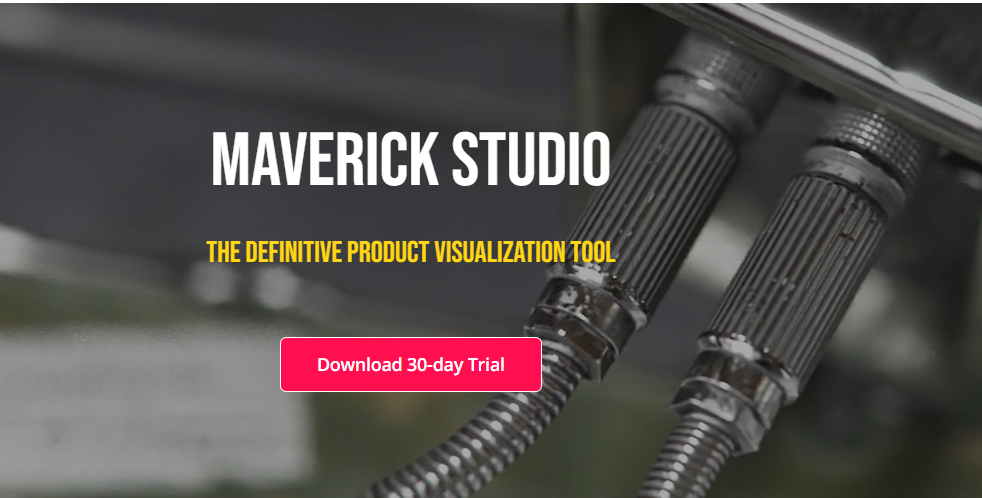
You longer need time-wasting UV mapping or bad-looking seams; Maverick Studio’s built-in uvmap system helps you choose triplanar projection and adjust the material scale.
Without any complication in beveling, you can easily round off any edge possible to automatically boost the reality of the image. It offers many parametric materials which are easy to configure according to your calculation. In addition, use surface mode in the move tool to place the object anywhere to follow the shape of the base object.
Use the ambiance library to change the scene by changing lighting setups. The shadow catcher solution helps you integrate 3D objects with backplates or pre-existing photos so that you can adjust the light to get the perfect combination.
Use gradient and normal light options to have a clearer image of the 3D object with realistic visualization. Maverick Studio provides you with ambiance composer, lightbox, trace sets, projectors, lightmixer, glare and bloom, depth of field, displacement, importing PBR textures, turntable animations, render sets, backdrop, and PSD.
Arnold
Do you have a demand for feature-length visual effects and animations?
Why not try Arnold?
Arnold is primarily used in many films like Cloudy with a Chance of Meatballs, Gravity, Pacific Rim, and Monster House. It is available in Windows, Mac OS X, and Linux and has supported plugins for 3ds Max, Houdini, Cinema 4D, Katana, and Maya.

It gives you amazing image quality and is easy to set up as per today’s production demands. Either use it directly or get an API if you are a developer. It helps professionals get a simple animation and VFX pipeline with a lesser set of user-interface elements.
Arnold offers features like Fur and Hair, motion blur, sub-surfacing scattering, volumes, flexibility, scalability, extensibility, instances, memory efficiency, displacement and subdivision, deferred geometry loading, AOVs, and standalone command-line renderer.
Download your 30-day free trial to know more about the tools and intuitive controls. Choose between single-user and multi-user subscriptions at a starting price of $45/month.
Blender
Get an open-source 3D creation suite – Blender that supports the entire 3D pipeline, such as rigging, modeling, animation, rendering, simulation, motion tracking, and compositing for free. It offers a Cycles Render Engine to get ultra-realistic rendering.
You will get real-time viewport preview, GPU and CPU rendering, HDR lighting and PBR shaders support, and VR rendering support. Its modeling tools make your work easier in creating, transforming, and editing your models.
Other options included are edge slide, grid, inset, bridge fill, advanced sculpting brushes and tools, dynamic and multi-resolution subdivision, Python scripting for custom tools, and 3D painting with masking and textured brushes.
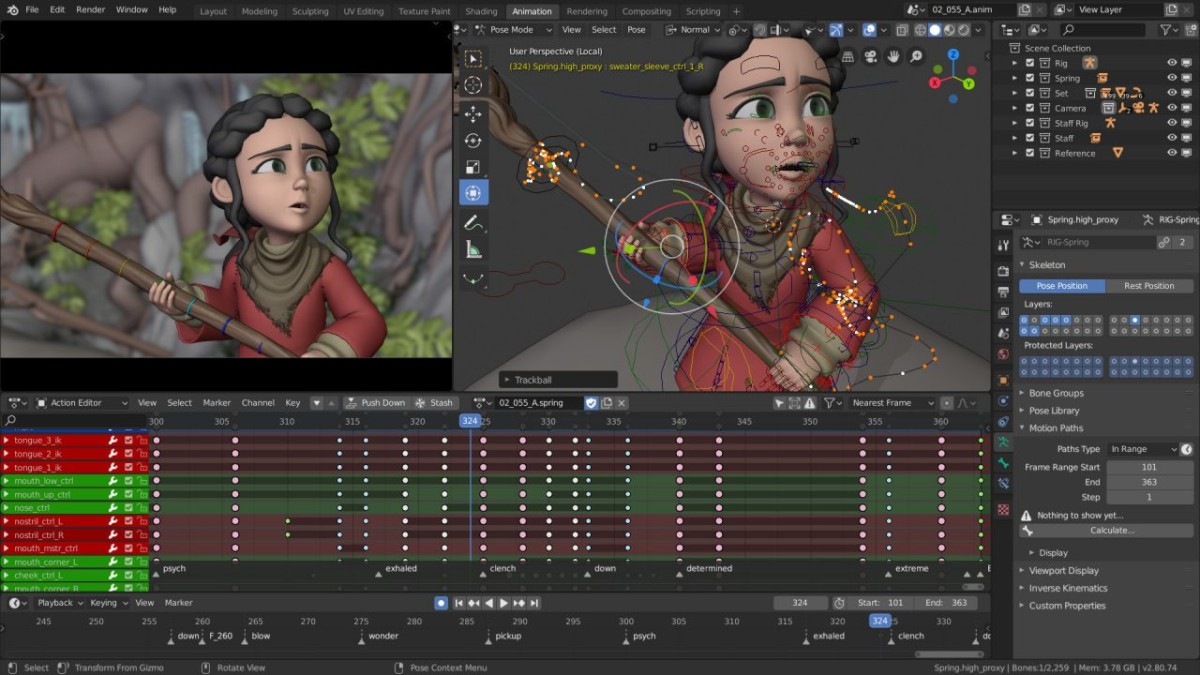
Blender includes object tracking and a production-ready camera that allows you to track the footage, import the footage, mask areas, and check the camera movements live.
Choose from manual and automatic tracking, powerful camera reconstruction, tripod solvers and planar tracking, real-time footage preview, and 3D scene. With the high-quality animation and rigging tools, you can shoot short films, feature films, TV series, and advertisements.
Use options like B-spline interpolated bones, custom bone-shaped, sound synchronization, curve editor, envelope, automatic, and skeleton skinning. Moreover, get full animation support along with Onion Skinning, combine 3D and 2D in the viewport, and use colors and layers for fill and stroke.
Indigo Renderer
If you are expecting rendering software with a photorealistic CPU and GPU renderer that aims at image quality by simulating the physics of light, it is now possible with Indigo Renderer. It offers dark UI mode, material previews, light layer thumbnails, RGB color curves, snappy Trackball navigation, and other useful features.
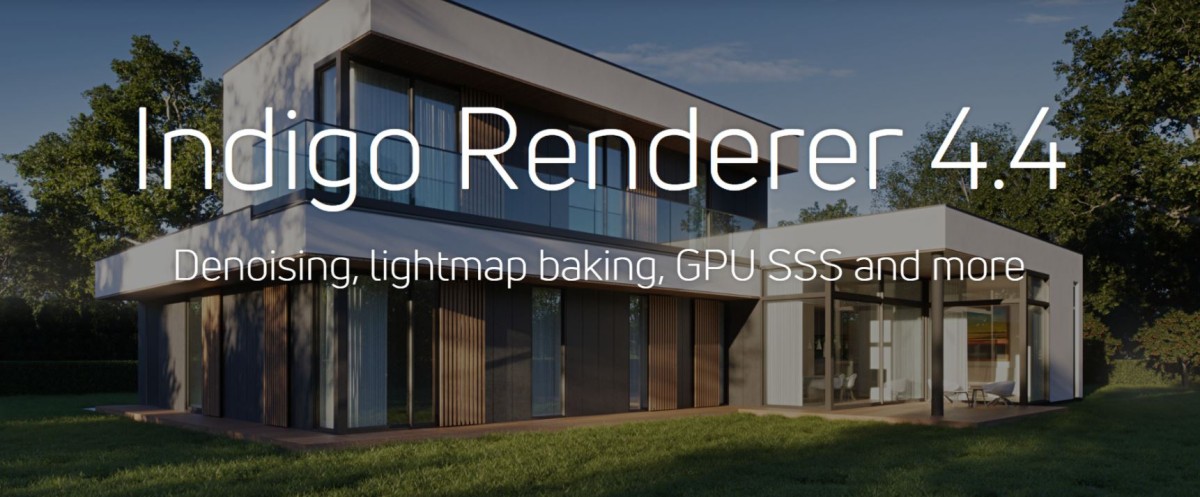
You will get better rendering performance using AMD or Nvidia graphic cards and camera models because of the photographic and interactive approach combined with abstract settings. In addition, you will get to experience the never-ending capabilities such as sun and sky system, multi-GPU rendering, accurate camera, aperture diffraction, and compositing tools.
Furthermore, it also offers editing and rendering, animation, seamless networking, displacement and subdivision, section planes, orthographic view, spherical view, and IES lighting.
Kerkythea
Render with Kerkythea is easy and free without compromising on the quality of the image. Kerkythea uses accurate lights and materials and provides all the necessary tools for scene setup such as material editor, render settings, editors, GL real-time viewer, etc., under a single interface.
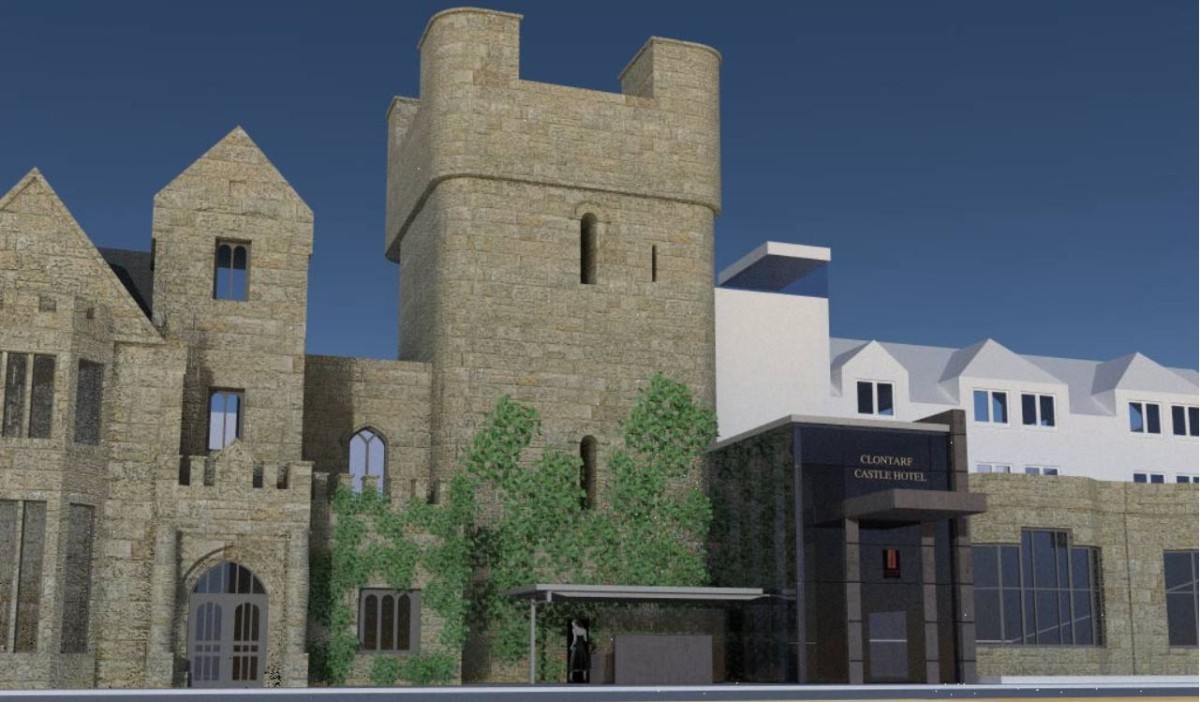
It is a full staging application used for rendering the models and is available for Linux, Mac OS X, and Windows. Kerkythea supports .obj or .3ds models and is also used as a plugin for SketchUp.
Materials have important roles while rendering to differentiate each object; therefore, Kerkythea provides a material editor system so that you will have full control over the final material. Get options like UV mapping, spotlight settings, sun and sky wizard, spherical view, shifting camera positions, model library, preset, and more.
Redshift
Redshift is built with the purpose of meeting your demands. It is a powerful GPU-accelerated renderer that supports studios of each size and creative individuals to use features and integrates with CG applications.
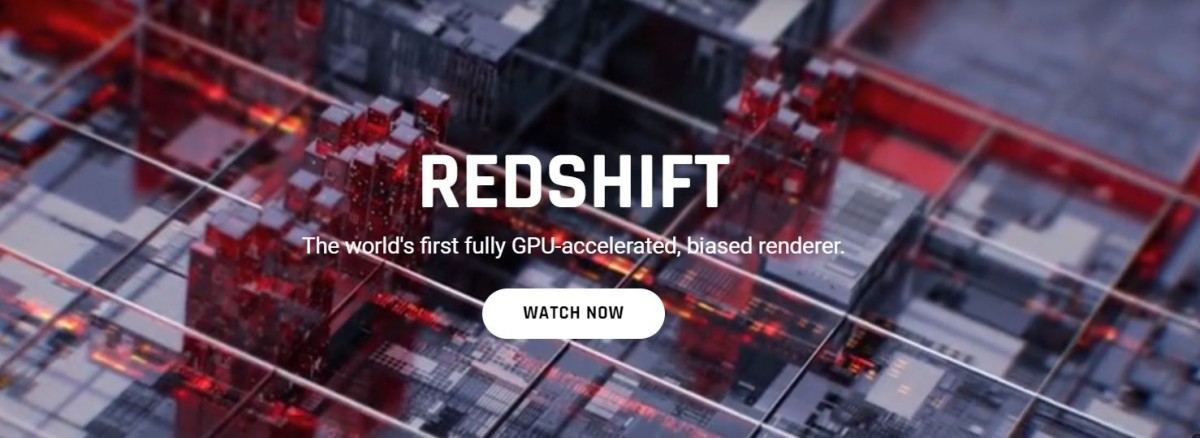
Its functionality allows you to have photorealistic results with the available resources. It supports advanced as well as complex texturing and shading networks capabilities for quality rendering. It integrates with 3D applications out there so that you can jump into any software without paying a penny.
Some integrations it supports are Autodesk Maya, Autodesk 3DS Max, Cinema 4D, SideFX Houdini, and Blender. Redshift also offers global illumination, out-of-the-core textures and geometry, proxies, volumetric rendering, hair rendering, displacement and tessellation, baking, per-object flexibility, SDK, Altus denoiser, physical materials, and a lot more.
Enscape
Empower your design with real-time rendering by focusing on creating, designing, and building with Enscape. It directly plugs into modeling software to give you a better design and visualization workflow.
Escape offers the fastest and easiest way to convert your models into awesome 3D experiences. It also offers features like a material library and a material editor overhaul, which is necessary while rendering.
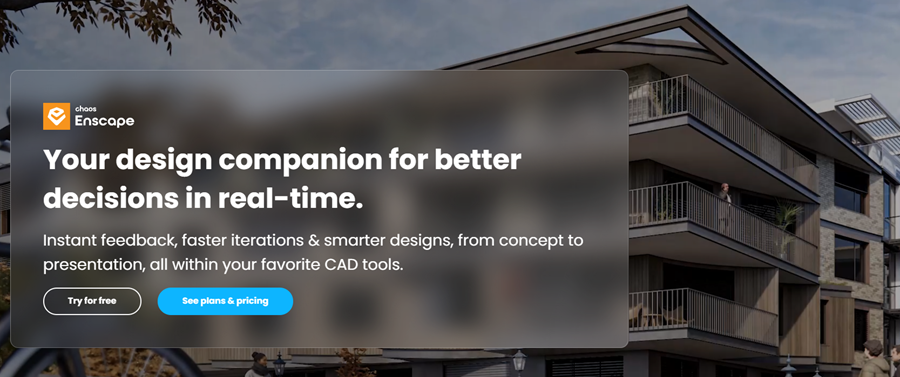
You can achieve super-quality renderings with NVIDIA DLSS (Deep Learning Super Sampling), use the gallery to produce better presentations, and more. As per your design needs, the set atmosphere allows the flowing of the wind and experience of the scene.
Get workflow tools like collaborative annotation (ortho views, custom assets, BIM info, materials, etc.), asset library (vegetation, furniture, vehicles, fitness equipment, lighting, buildings, etc.), and roadmap.
The price starts at $39.90/month when billed yearly for a single machine.
Maxwell Render
Do not struggle with countless parameters tweaks and complex computer graphics terminology to showcase your creativity. Maxwell Render is developed for designers, artists, and architects to experience reality in their models with less setup time and an easy-to-use interface.
The rendering engine of Maxwell combines lighting with materials to create highly realistic and accurate images. It is compatible with CAD or 3D applications and is used in different sectors like jewelry, the automobile industry, interior designing, etc.
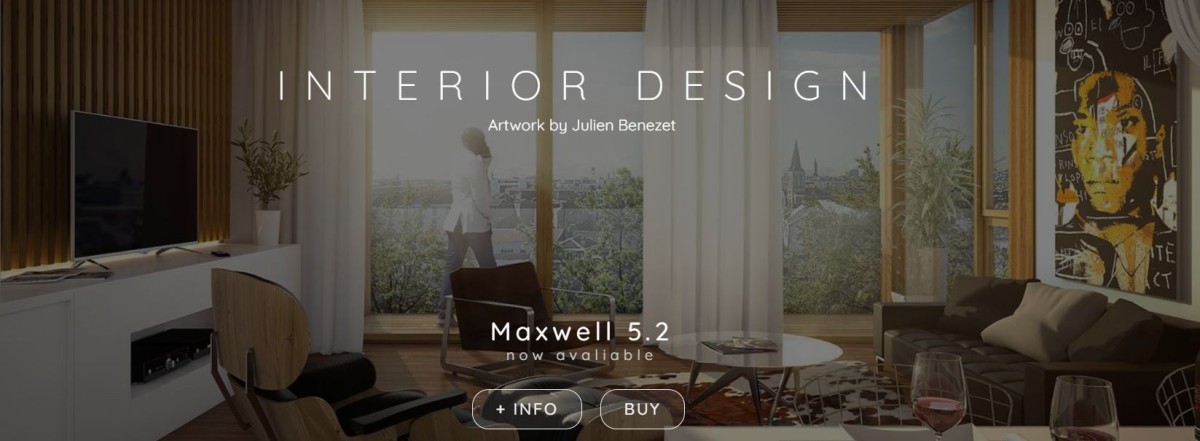
Multi-GPU core delivers faster results maintaining physical accuracy, and provides accurate results in seconds. You will also find a denoiser implementation in the new version of Maxwell. For getting a perfect quality, you need some essentials, and Maxwell has them for you.
You get options like interactive fire, random colors, multilight, random UVs, 3D motion blur, physical sky, volumetrics, sea, hair, grass, fur, v-ray scene import, and much more. The advanced features include realflow import, Pixar open subdiv, improved workflow, high resolution(4k), memory saving, extra sampling, deep compositing, channels, python scripting, and alembic.
Try Maxwell Render with a 30-days free demo and experience the result you expect.
KeyShot
If you want to have rendering software that you can use with higher flexibility without any complications, KeyShot is the answer. It is an essential rendering software that is used in product development to get realistic results. It provides you real-time 3D rendering experience that delivers instant results and reduces your time creating product visuals.
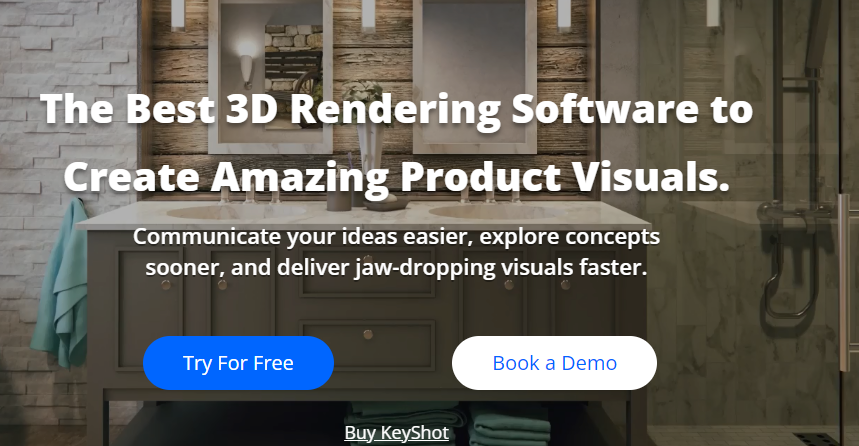
KeyShot supports more than 30 leading 3D file formats and offers free plugins. Get 750 preset material options and thousands of more materials in KeyShot Cloud, along with advanced capabilities.
KeyShot offers the detailing of the product so that a perfect image will be out at the end. You can easily apply textures, variations, and labels and experience speed while creating images or animations. Download KeyShot to see its speed for mac OS and Windows.
LuxCoreRender
LuxCoreRender is an unbiased and physically based rendering engine. It can simulate the flow of the light based on state-of-the-art algorithms according to physical equations, and hence, produces photographic quality images that look real.
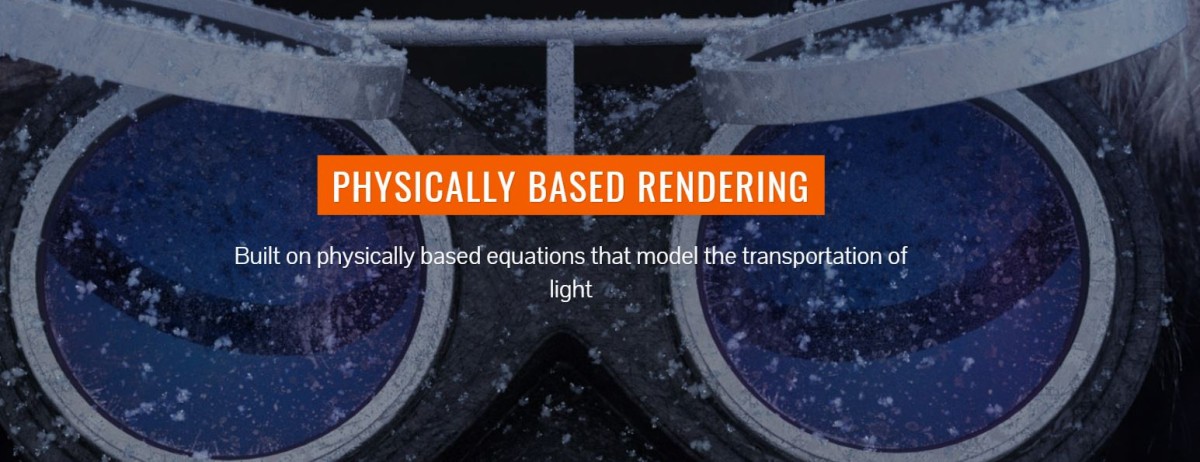
The transportation of the light helps you capture a realistic image without doing much. LuxCoreRender uses CUDA and/or OpenCL to run several GPUs and/or CPUs available so that you can experience excellent performance while rendering.
It offers textures and materials, light groups, lighting, cameras, instances, motion blur, lens effect, depth of the field, tone mapping, cross-platform, etc. LuxCoreRender is a free software both for commercial and private use.
RenderMan
Are you looking for a flexible renderer for your production?
RenderMan can match your expectation with its outstanding performance and features. Use it for visual effects, scalability, animations, and more. It provides tools straight from ILM and Pixar, including light transport and materials.
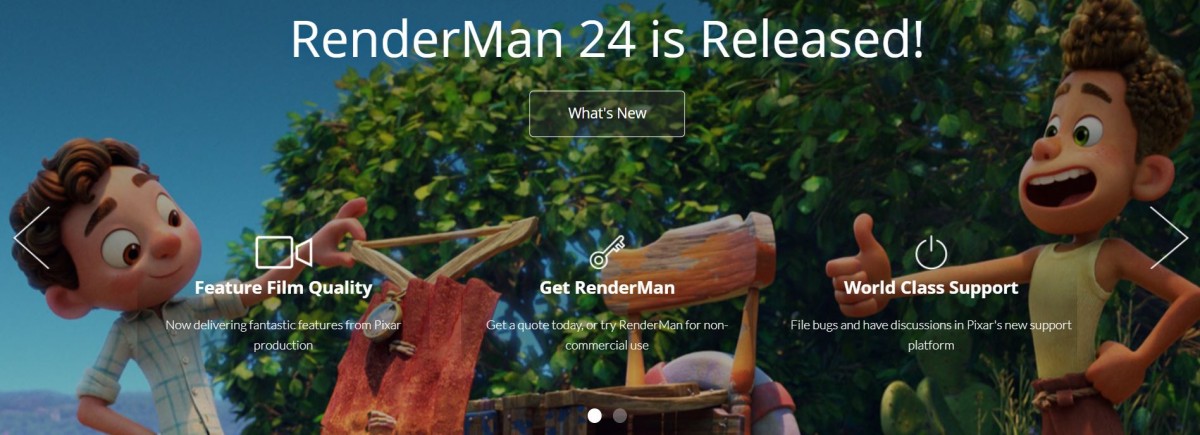
RenderMan runs with comprehensive APIs and the latest open-source tools so that you can produce complex collaborative environments for pipeline flexibility. It gives you MaterialX Lama, a new layered material system that meets your needs for next-level visual effects.
The tool offers volumes and particles, integrators, checkpointing, hair shading, displacements, production denoising, secondary passes, motion blur effect, etc., to give you full control over your production. Get Non-commercial RenderMan for free or choose a paid package for professionals.
Lumion
Breathe life into rendering when you have Lumion software. Convert your initial thought to a big presentation by importing your model from CAD software and adding visual effects to it.
Choose from 1250 materials and 6300 objects in the library to give life to the exteriors, landscapes, urban projects, and interiors. You can also add cinematic effects, 60 atmospheric effects of expressing the emotion and beauty of your model.
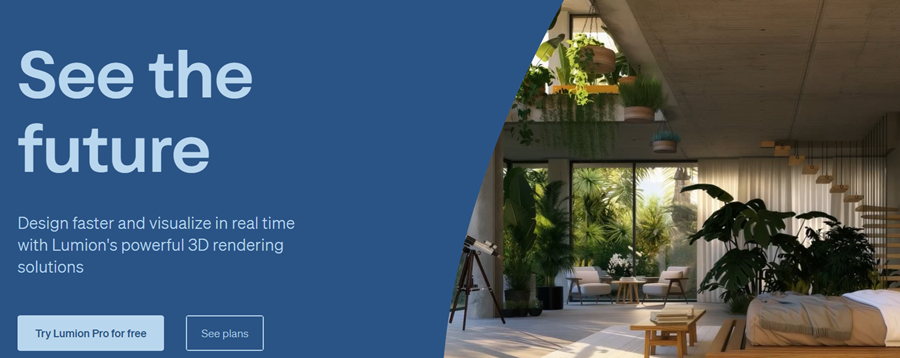
Lumion removes the barriers between your thinking and a complex structure. With the free flow of the rendering software, you can capture realistic images and make your architectural project a unique yet beautiful one.
Buy it for once and use it for unlimited time, including the library of materials and rendering effects. You can take a 14-days free trial by providing your complete information with a limited number of materials and effects.
Marmoset
Marmoset offers Toolbag 4 – a real-time 3d rendering tool that comes with a 30-day free trial for new users. It’s a brand new rendering and ray tracking engine that runs on modern GPUs and offers faster results with native support for NVIDIA RTX devices.
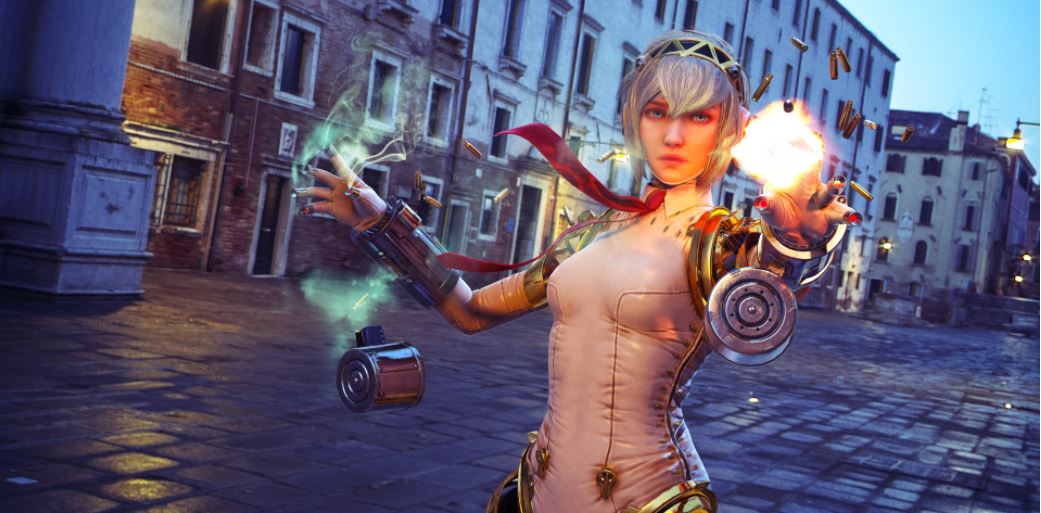
The tool brings a higher level of image quality with improved reflections, shading, caustics, global illumination, scattering, etc. This game-styled, industry-standard renderer offers customizable AO, diffuse light bounces, smooth anti-aliasing and transparency, and enhanced CGX.
Conclusion 👩🏫
Bring your designs to life with realistic elements, context, and other details by using the best 3D rendering software like the ones we discussed. You can use the information above to choose the best one for your requirements and budget.

